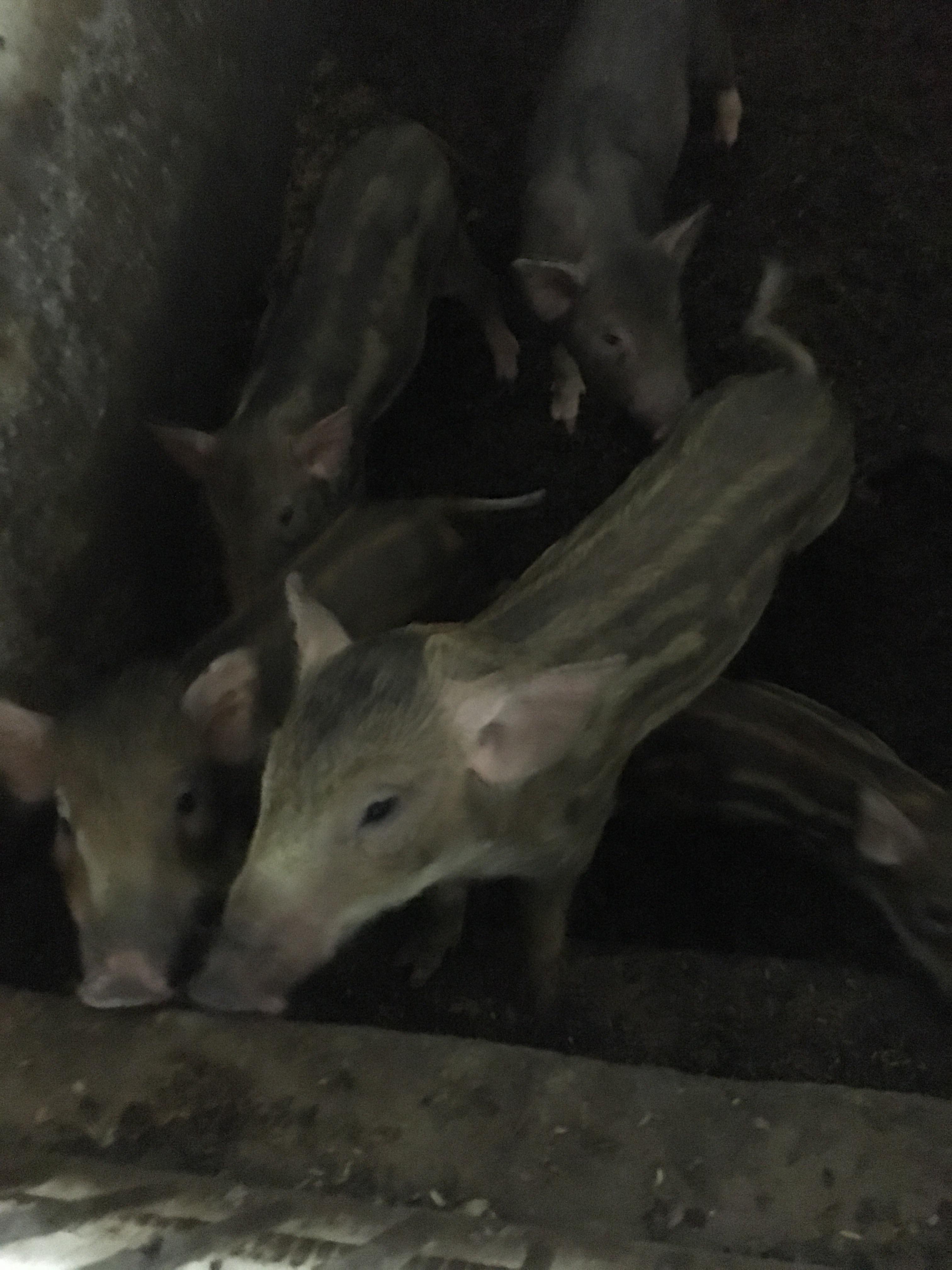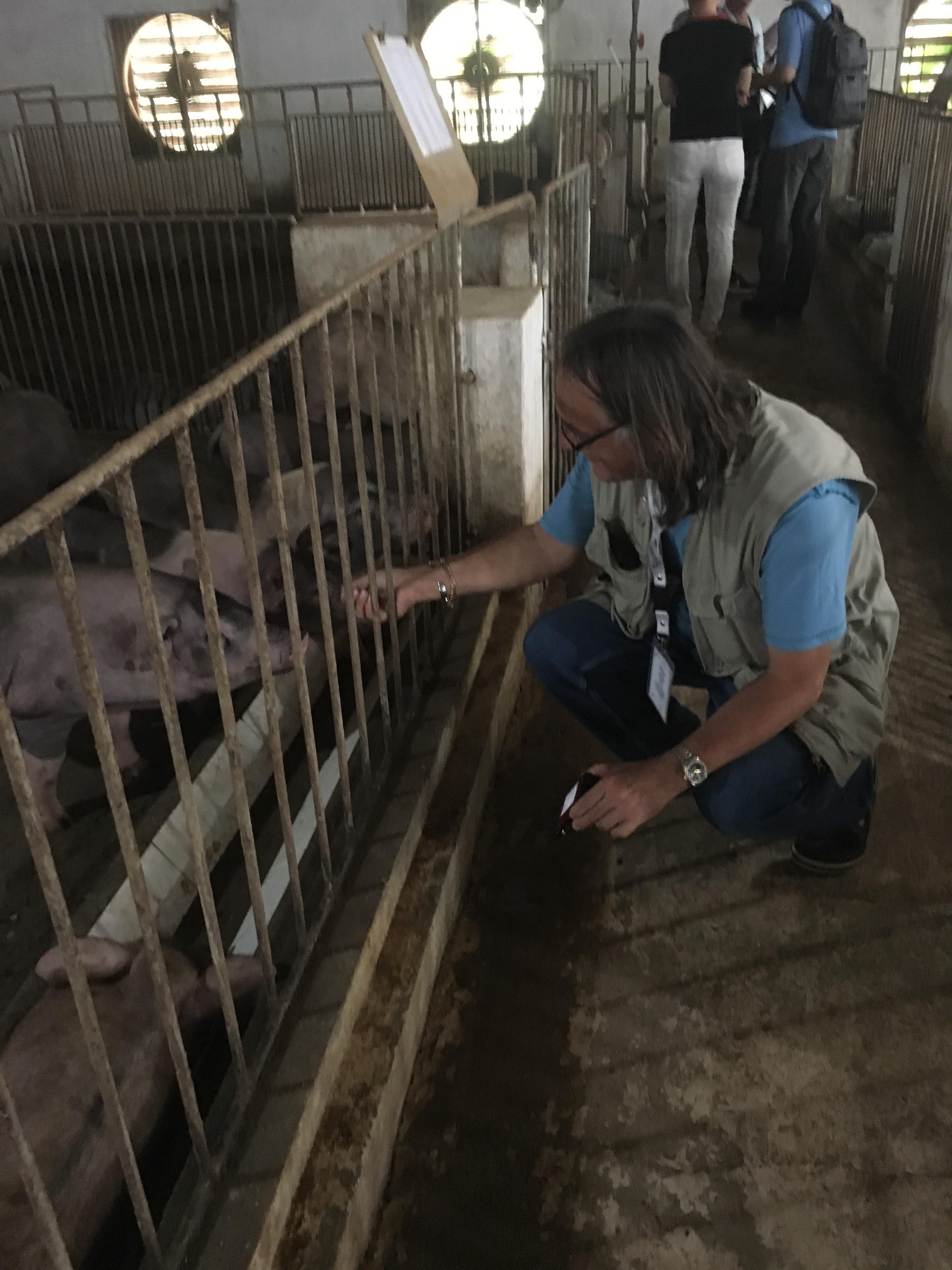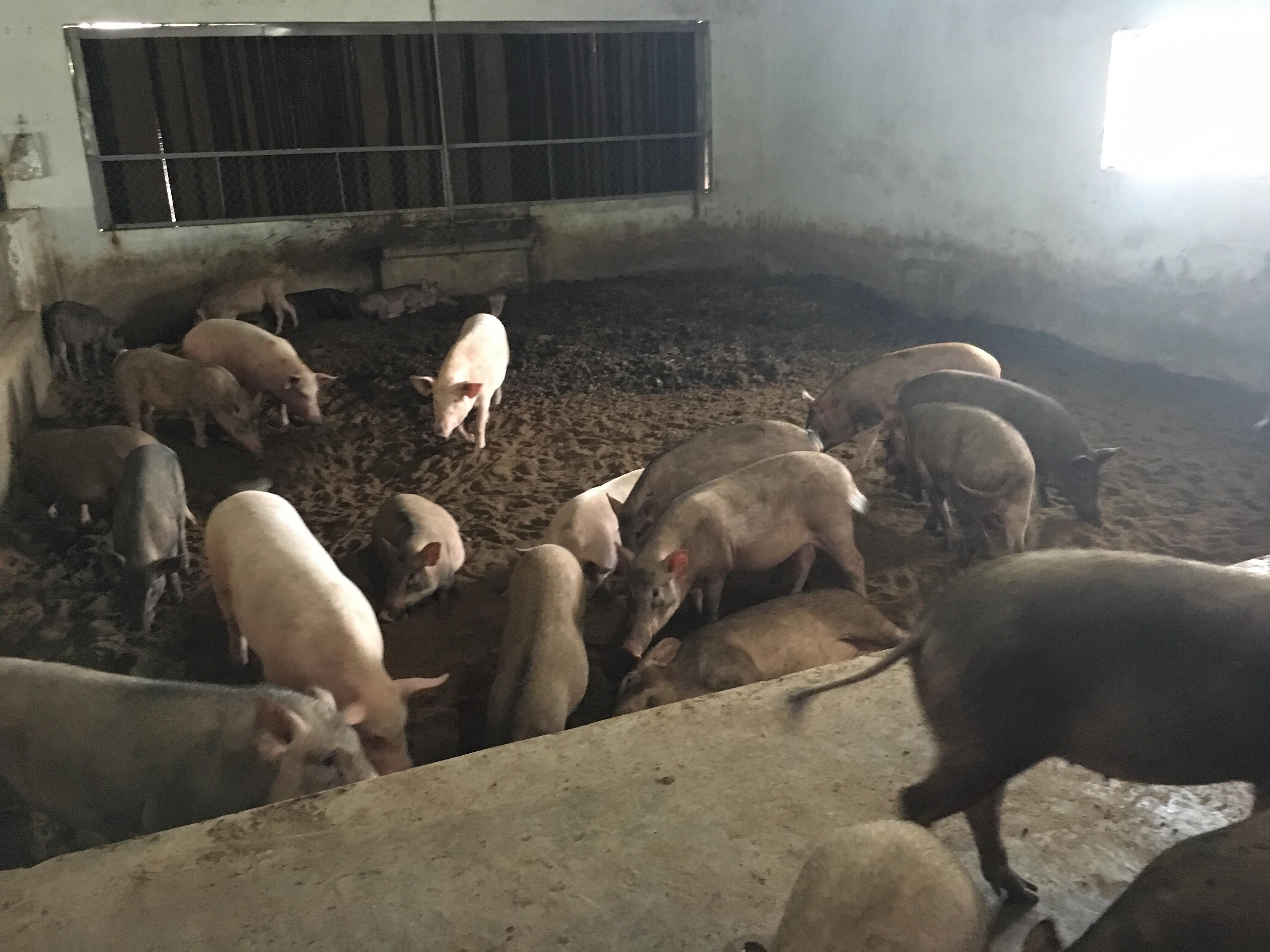Hello everyone! My name is Thanh (From CCS)
It was an amazing day with me to have a nice field trip to Ngoc Linh ecogarden. I'm really love pigs and people there with their great works.
Thanks to their efford, we have oppotunity to know how efficient on raising pigs with living bio-bed.
Look at Paul, he's talking to the pig and make friends together!!!
On the 4th day of training, we visited the Living Bio - Beds Pilot Project, and it is true that this model of pig raising is much cheaper to start and besides from pigs, you can also harvest organic fertilizer
( compost ) from the bedding of the pigs after every 3 - 6 months, this technology is also environment friendly and can minimize the pollution.
I am from the Philippines, working at IIRR (International Institute of Rural Reconstruction) Philippine Program at Panay Learning Community in Ivisan, Capiz. We work on different project with various approaches (such as Psychosocial, DRRM and Livelihood), and promote CSA (climate smart agriculture) in crops, aquaculture and livestock. I acquired a lot of learning from this training on living Bio Beds for swine farming in Hanoi. On the 4th day of training, we visited the living Bio Beds demonstration farm, where they practice the organic pig rising and production. The breeds raised in the farm are native pigs. We observed that they have strictly manage by using foot bath (disinfectants) before entering the farm by the visitor/adapter, the organic feed they used in feeding are made from waste product of soya beans in Tofu production, corn bran and rice residue from rice wine processing. Feed are fermented inside the plastic container for 1 to 3 days depending on the temperature before feeding pigs. It takes 6 months of time for pigs to be ready for market/slaughter with the average weight of 70 to 90 kilos live weight. The advantage of the approach is that the meat produced can generate more profits comparing to the traditional and commercial pigs raise. Taking this opportunity I will make necessary adaptation and bring this technology to the organization and to the small farmers in community where I worked and where there are climate smart agriculture practice and business opportunity.
Junedel U. Buhat
We learned about Theory of change and conducting community research, both qualitative & quantitative basis
These session are highly important for my team in LAO.
Tôi là Phạm Văn Lập, hiện tôi đang làm việc tại Công ty TNHH công nghệ nông nghiệp hữu cơ xứ sở Dế Mèn. Tôi đến hội thảo "Nuôi trồng vì đa dạng sinh học" này với mong muốn được học tập và chia sẻ những kinh nghiệm quý báu về thực hành Nông nghiệp bền vững. Mục tiêu của tôi là lĩnh hội được nhiều nhất có thể những kiến thức từ cuộc hộ thảo này, sau khi trở về tôi sẽ sử dụng nó để áp dụng với khu vực của tôi và lan tỏa đến những người khác nữa.
Hi all, here comes newsletter of Day 1, 2 and 3 in both Vietnamese and English. Enjoy reading!
I met new friends from another countries, shared knowledge and experience on conserving Biodiversity, I learned the difference between commercial marketing and social marketing and also how to prepare a journey map
which were very interesting for me.
I am Joselito, from Philippines and I work as Farm officer at IIRR ( International Institute of Rural Reconstruction, Yen Center ). On the third day of our training, we visited Hong Ha, the community that most of the households are raising pigs, but one thing we noticed, the waste disposal directly goes to the Red River, which will create a big problem to our environment, and we think that the technology of Living Bio beds will help a lot to solved this problem.
Myself Saylend working with SUPA project is Agriculture Coordinator traveled from Loungnamtha northern of LAO to Hanoi VIETNAM for attend a training workshop '' Campaigning for Conservation'', which takes 2 weeks ( 12 days).
I'm looking to learn something new from you.
Thanks
Saylend
Vietnam Organic Agriculture Association (VOAA)
Với tôi được tham gia chương trình là một điều tuyệt vời...... Thật thú vị, Tôi có thể khám phá bản thân mình, được học hỏi những điều tôi đã từng làm nhưng giờ mới biết nó là như vậy!!!!!!!!!!!!!!!
!
Hello Everyone,
I am looking forward with pleasure to being with you for the upcoming C4C training in Vietnam. The bio beds solution developed and promoted by A Growing Culture and the Centre for Creativity and Sustainability has huge potential for ecological improvement and farmer prosperity. IFOAM - Organics International is happy to collaborate with these excellent organizations and with Rare to help spread the practice and use it as a key tool in moving our communities and regions toward true sustainability.
It is our intention to not only share the practical how-to of the solution itself, but to also link it to the bigger picture of incomes, markets, and politics - so that we can get more people involved and working toward our shared goals.
Having worked with Rare already this year on two other C4C's - one in Mexico and one in Ecuador - I can assure you that your time will be well spent! You will learn a lot, come away with new knowledge and skills, build your networks and support systems, and have some fun.
I have been to Vietnam one time before, in 2015, and await yet another enriching experience being in this beautiful country and with such friendly people. Please feel free to contact me here or at d.gould@ifoam.bio and ask whatever you like. I have also uploaded to this platform a selection of reference materials from IFOAM - Organics International. We have much more available. Check out our website at www.ifoam.bio.
Warm regards,
David Gould - Senior facilitator, IFOAM - Organics International
Dear participants, we are excited to have you join us for 12-days of training in the use and promotion of Living Bio-beds in pig husbandry. The days will be long but it will be fun. I look forward to seeing you all on August 6th.
Kính gửi quý thành viên khóa học, chúng tôi rất hân hạnh khi quý vị tham gia với chúng tôi trong 12 ngày đào tạo về sử dụng và quảng bá kỹ thuật đệm lót sinh học trong chăn nuôi lợn sắp tới. Đây sẽ là những ngày dài nhưng cũng hứa hẹn sẽ rất vui vẻ. Tôi mong chờ được gặp tất cả các bạn vào ngày 6 tháng 8 này.
Paul Butler, Senior Vice President, Rare
Rare and its partners (IFOAM, AGC and CCS) are excited to announce the upcoming 12-day C4C and technical training workshop in the use of Living Bio-beds in pig husbandry. The workshop, from August 6th-17th, will be held at the Ba Vi Resort near Hanoi in Vietnam and will bring together participants from the host country, as well as India, Sri Lanka, Cambodia, Laos and the Philippines.
The current use of concrete-floored pigsties are expensive and time-consuming to construct, cause discomfort to the animals living in them, and can lead to effluent (pig manure, urine and waste water) entering adjoining streams and rivers resulting in eutrophication, declining water quality and fish-die-offs. There is a better way... Living Bio-beds (http://www.agrowingculture.org/fermented-bed-technology) are an important and timely technique designed to immediately eliminate any pollution from pig production, while creating a healthy, odor-free and clean environment for the raising of pigs. Additionally, this innovation opens the door to a number of additional markets that can be incorporated into the farm regardless of size.
At the workshop participants will learn more about this “solution” and how it can be promoted to farmers in their area during the twelve days together. Three days will be spent broadening and deepening participant understanding of the uses and benefits of the Living Bio-bed solution. We will explore how farmers and the rest of the value chain can use the solution to further improve the productivity, product quality, income, as well as the overall sustainability and prosperity of their own enterprises. Participants will get hands-on practice in building food systems - knowing about and working with the system’s different parts, how they interact with each other, and how to develop them toward further progress.
The adoption of new innovations is not only dependent on knowledge, so eight days of this training will also incorporate workshops on igniting behavior and social change within communities to accelerate the take-up of techniques like Living Bio-beds. Participants will learn the principles of social marketing and how to use research to better understand the drivers of human behavior. They will put lessons learned into practice using real-world situations and will themselves create simple, cost-effective, focus-group-tested materials and activities to engage communities and promote new behaviors. Participants will leave the workshop able to design and implement mini campaigns. Campaigns that are designed to increase the public’s appreciation for nature and the adoption of more sustainable behaviors.
This portal provides a space for participants to exchange ideas both during and after the workshop, as well as a forum to discuss sustainable farming techniques with others from around the world.





































